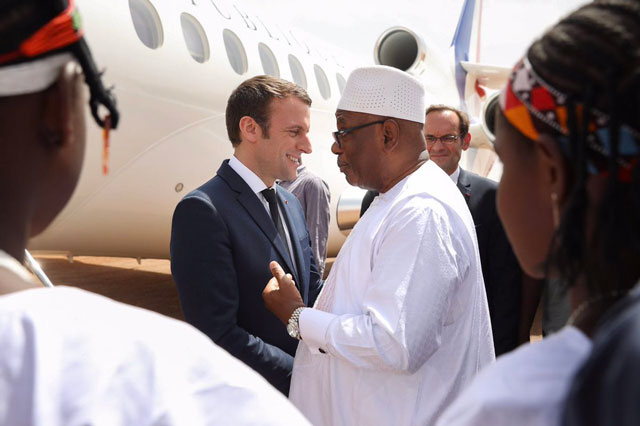
Bamako, Mali | AFP | French President Emmanuel Macron arrived in Mali on Sunday to consolidate Western backing for a regional anti-jihadist force, with France urging greater support for the Sahel region amid mounting insecurity.
The so-called “G5 Sahel” countries just south of the Sahara — Burkina Faso, Chad, Mali, Mauritania and Niger — have pledged to fight jihadists on their own soil with instability and Islamist attacks on the rise.
Macron is joining the heads of state of these nations in Bamako for a special summit where France’s full support for the force will be announced, with a focus expected on providing equipment.
With its base in Sevare, central Mali, the 5,000-strong G5 Sahel force aims to bolster the 12,000 UN peacekeepers and France’s own 4,000-strong military operation known as Barkhane operating in the region.
He is also expected to make the case for extra backing from Germany, the Netherlands, Belgium and the United States — which already has a drone base in Niger — beyond a pledge of 50 million euros ($57.2 million) by the European Union.
Serge Michailof, a researcher at the Paris-based IRIS institute, described the EU contribution as “a joke” in the context of the EU’s “very deep pockets”.
“This force is going to cost $300-400 million at the very least,” he told AFP, and would be especially difficult for certain nations involved which are already “choking” on military spending.
The question of funding is sensitive as Chad’s leader Idriss Deby has said that for budgetary reasons his troops cannot serve simultaneously at such high numbers in the UN peacekeeping mission and also in the new force.
Deby and Macron are due to meet on the margins of the Bamako summit to discuss the issue, according the French presidency, as Chad’s military is widely viewed as the strongest of the five Sahel nations.
– Phased rollout –
Macron visited Gao in northern Mali in May, his first foreign visit as president outside Europe, and said French troops would remain “until the day there is no more Islamic terrorism in the region”.
France launched an intervention to chase out jihadists linked to Al-Qaeda who had overtaken key northern cities in Mali in 2013.
That mission evolved into the current Barkhane deployment launched in 2014 with an expanded mandate for counter-terror operations across the Sahel.
The new Sahel force will support national armies trying to catch jihadists across porous frontiers, and will work closely with Barkhane.
Operations across Burkina Faso, Niger and Mali, all hit with frequent jihadist attacks, will be co-ordinated with French troops, a source in the French presidency told AFP earlier this week, while help would be given to set up command centres.
Macron’s visit came as Al-Qaeda’s Mali branch released a proof-of-life video of six foreign hostages, including Frenchwoman Sophie Petronin who was abducted in late 2016 in the northern Malian town of Gao.
– Multiple fronts –
While weighing up the challenges of the G5 Sahel operation, analysts frequently compare it with the Multinational Joint Task Force battling Nigerian jihadist group Boko Haram in the Lake Chad region, composed of troops from Benin, Cameroon, Chad, Niger and Nigeria.
Despite heavy initial criticism that force “has succeeded in a part of its mission, which is to reduce the territory controlled by Boko Haram and limit its actions,” said Rinaldo Depagne from the International Crisis Group, a non-governmental organisation that works to prevent and to resolve conflicts.
However, the G5 Sahel force has supplementary challenges in the weak armed forces of Burkina Faso and Mali, while Chad and Niger are already engaged on multiple fronts, he added.
The three-nation border of Liptako-Gourma will become a “laboratory” for Burkina Faso, Mali and Niger where French forces will aim to work in tandem with these nations, before bringing Chad and Mauritania into the mix, Depagne predicted.
The G5 Sahel force’s top commander, Malian general Didier Dacko, has said that at first each country’s contingent would operate on its own soil, gradually becoming more focused on their mutual borders.
There would be “close collaboration with Barkhane forces and the UN mission,” Dacko told AFP.
 The Independent Uganda: You get the Truth we Pay the Price
The Independent Uganda: You get the Truth we Pay the Price



